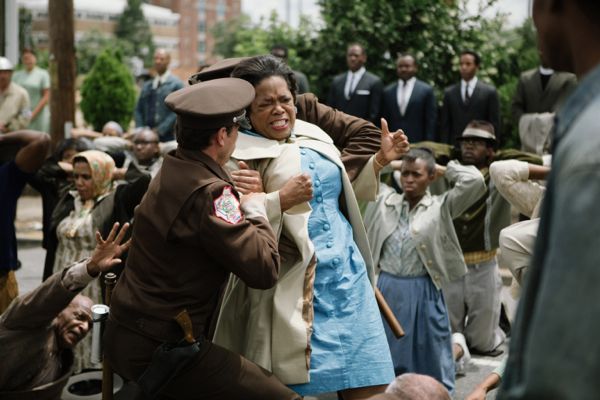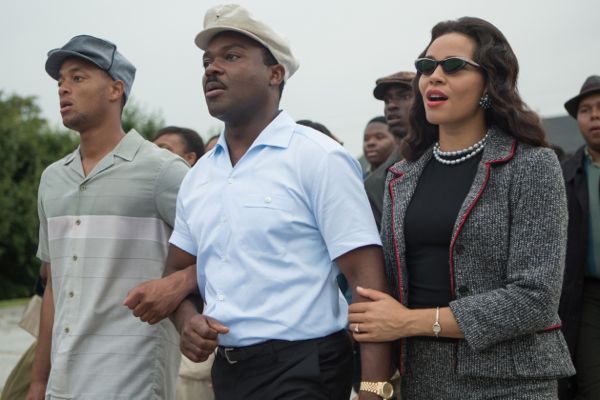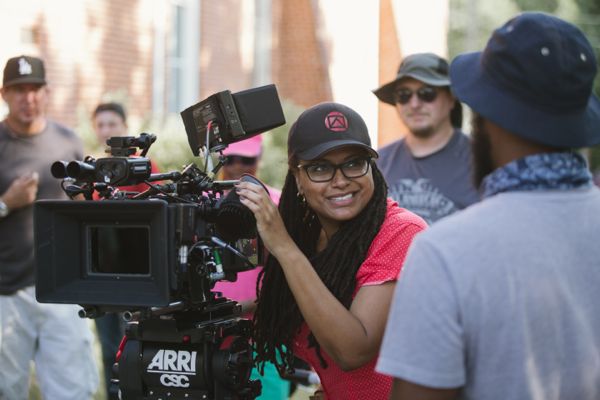SELMA's David Oyelowo, Oprah Winfrey, Director Ava Duvernay On Their Oscar Nominated Film
- Details
- Category: Interviews
- Created: Sunday, 18 January 2015 07:29
- Published: Sunday, 18 January 2015 04:59
- Written by Lupe R Haas
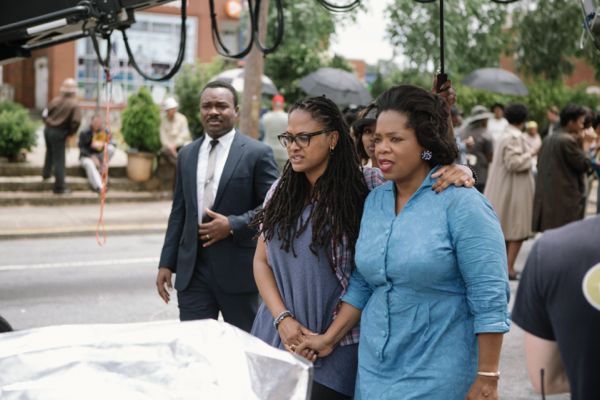
SELMA, now an Academy Award contender for best picture of the year, chronicles Martin Luther King's campaign to bring equal voting rights leading up to the historic march from Selma to Montgomery, Alabama in 1965. SELMA's David Oyelowo, Oprah Winfrey, Tim Roth, Carmen Ejogo, Tom Wilkinson, Common and director Ava Duvernay talk about what a movie like SELMA means in history and in today's tumultous times in this QA.
David Oyelowo, who portrays Martin Luther King, Jr., spearheaded the making of SELMA, and he enlisted Oprah Winfrey as a producer to bring the film to the big screen. The cast and director talk about what it means to them to be part of SELMA, and its relevance to the modern day protests over Ferguson and Eric Garner.
Q: From a director’s position, how did you strick the balance between a responsibility to history, if you will, or responsibility to a true story, and the creative kind of narrative that you wanted to tell in this film.
AVA DUVERNAY: Yes, well, thank you all for being here. It’s good to see everybody. I think no one here wanted to make a film about a statue or a speech or a sale or a street name or initials or a catch phrase or all the things that I feel King has been reduced to in a lot of ways. He was a dynamic, charismatic, you know, brilliant mind, he was a man of faith who was sometimes unfaithful, he was guilty, he was depressed, he had an ego, he liked to laugh, he was a prankster, he was a human being. And there hasn’t been a film made with Dr. King at the center released by a studio ever. And so when we were charged to do it, you know, our main goal was to show him in all of his human complexity and kind of unlock him from the statue and let him live and breathe and tell the story through that lens.
Q: David, and speaking of unlocking him from the statue, you were given the task of doing that and translating that statue into real life. Please, tell us about your process. When we look at you now, obviously the transformation was dramatic, from who you are in real life to who you played on screen, David. Talk about the creative process you undertook.
DAVID OYELOWO: Well, you know, Dr. King did not think of himself as an icon. He didn’t walk around thinking of himself as a historical figure. He was a man. And you know, I am so full of admiration, in terms of what he did, and I am not him, but the thing that I could seize upon was he was a father of four, as I am, he was a Christian, as I am, he was someone who valued justice, as I do, and those were my entry points. One of the most valuable sources I had for finding him was [PH] Andrew Young. I spent a lot of time with Ambassador Young and he talked to me about his friend. He talked to me, as Ava just mentioned, he talked to me about the prankster, the father, the man who was at times unsure, and that was the foundation on which I had to build. Of course, as an actor, you have to do the technical things, you know, the weight gain. And also, you know what? One of the amazing things for me was the journey I went through in order to get to this place. I had the privilege of being in films like Lincoln, in which I played a Unionist soldier, I played a preacher in The Help, I played a black fighter pilot in Red Tails, I played the son of a butler in The Butler. And who was in the sit-ins, in the freedom rides, became a Black Panther, you know, all these things also went into this portrayal. So I kind of feel like in the seven years since I read the script, I was on this journey towards this and now, it culminated in the right people coming together to make the film. I have to give such credit to Jeremy and DeeDee for sticking with the project for eight years. A lot of producers, considering how many false starts we had, would have maybe shelved the project. They didn’t. And so, you know, the right people, as I say, came together to support me in doing what I did.
Q: Oprah Winfrey what was your motivating force to be behind this film as a producer. But you also decided to give us your creative talent to this film. Why did you choose to play a role in front of the camera as well as behind the scenes?
OPRAH WINFREY: ‘Cause Ava made me do it. Ava made me do it. Ava sent me an online piece regarding the real Annie Lee Cooper that was from a Selma newspaper when she celebrated her 100th birthday in 2010. And in that piece, it talked about her life and her memories of that time in Selma where she actually knocked out a sheriff. She had the fight with Sheriff Clark, and at the end of the piece, it said every day now, she watched the Oprah show at 4:00, with a tuna fish sandwich. And she did that on purpose. And Ava said, “Don’t you think it would mean a lot to her to know that you who she watched every day at 4:00 with the tuna fish sandwich was portraying her?” And that was it, ‘cause I’d said, no, no, every film I’ve been in, I end up hitting somebody. My last movie I had to slap David. And I said, “I don’t want to do another film where I’m knocking somebody out or I’m having a fight” and so forth. But that, it really happened, and it happened that, you know, there’s a famous photograph of her being pinned down by the two deputy sheriffs. And so I said yes for Annie Lee Cooper, and the tuna fish sandwich and watching the Oprah show every day, but more importantly, for every other woman and man in my history who took that walk to the registrar’s office and was turned down and then went back home and tried it another year, and then went back and tried it another year. This was Annie Lee Cooper’s fifth time. And when you think about what it takes to keep getting up and saying, I will, and I can, in the face of an entire society that says that you cannot and you will not, I just wanted to be able to take the few minutes in that walk and pay tribute to all of those people. That’s why I said yes.
Q: Jeremy and DeeDee, there are always so many stories behind the scenes that when we learn of them, they’re so critical to a film being made, and we’ve spoken about the power of what this film means today. Can you share with us some of the stories as to – or one key story – as to how this film came to be now, in this moment, when it took so many years to come to life?
JEREMY KLEINER: You know, it did have a long history, as you mentioned, but you know, my kind of vantage point is really the moment where we met Ava and her kind of incredible vision and the different qualities that made her the perfect filmmaker. That’s kind of the moment I remember, where we looked at each other, and after a number of false starts, it felt like, wait, this actually – this is gonna come to pass, this film.
DEEDEE GARDNER: Well, it has nothing to do with me, which are usually the best stories. I think the most extraordinary moment is the one that David tells about sitting on an airplane next to someone who was reading Ava’s script, from the middle of nowhere, and wondering if he should invest in it. And David, reading the script in that moment, and then calling Ava, introducing himself, and saying, “I want to be in your movie,” the fact that that happened and we’re here, like, that’s the coolest part of the film business, I think, just the really circuitous and strange way that curiosity and art can have staying power.
Q: Ms. Carmen, such a beautiful performance as Coretta Scott King. This was not the first time you played Mrs. King. Can you tell us about what you brought to the role and how potentially you learned from your first portrayal into your second?
CARMEN EJOGO: Sure. Well, I think I was excited to explore the character for a second time, which I can’t think of any other actor that’s got the chance to do that, to explore the same character at a different part of their life. I think what excited me about doing it again was that it was a very different take, and she’s a very different woman at this point. There’s a burden, there’s a weariness. The marriage is in a very different space. And I think Ava’s intention to not explore the iconography of these people and the mythology and to sort of get behind the curtain and to deconstruct the mythology was what was most intriguing to me. And I’m really excited by characters that have an external life that maybe doesn’t match up to the internal, and I feel like Coretta was very much that person. I remember watching an episode of Oprah while I was in the UK of a makeover of Coretta.
OPRAH WINFREY: Good lord!
CARMEN EJOGO: Yeah. And it stuck with because – and I didn’t really know who Coretta was at that point. I was just a girl in the UK watching your show, and I remember, though, very vividly, being so struck by a woman who still had a hairstyle and a makeup that was sort of stuck in time, to some degree, that she was really holding on to a moment in time that she felt in some ways beholden to. And then you did a great job and you made her look so different. And there was a whole other life that came out in her in that moment, and then the next day she went back to being what we expected of her.
She couldn’t do it. And I think part of that was really interesting to me, a woman that had so much vitality and she was an academic and an intellectual and an artist and a singer, and that somehow she felt that those things had to be somewhat suppressed for the betterment of the movement, for the sake of the marriage, for the sake of being the mother to her children. That was so heroic to me in so many ways. But the opportunity to explore and to reveal those parts in her, in some small way, and I feel like the brilliant scene that Ava wrote in the center of the film where you get to see her finally being powerful and vulnerable and frustrated and all of these dynamics, for the first time, for me on film, I think you get to see a far more multilayered woman than I got to play in 1955 in Boycott, for example. So that’s why I wanted to do it.
Q: Ava, how challenging is that for you to have added so many layers to a story which could have been told as a cradle to a grave, could have been told as “I have a dream” and so much built-in drama for the voting rights act, but you devoted so much time on this screen to what we’ve been talking about, the love story and the personal story. A risk for you as a filmmaker to do that?
AVA DUVERNAY: No, I mean, a risk for me as a filmmaker to make a film that feels like medicine and spinach, and I mean, you know, we’re on the other side of it now so it feels good. But facing the idea of making a film about Dr. King, it’s like how do you do that, like, what do you do to make that feel urgent and vital and immediate and not like a dusty history book? And so, I mean, the ways you do it is you focus on story and character, and in order to focus on story and character, you have to be telling the truth about people. That’s the only way to do that, to make this not be an after school special type of thing that I don’t think anyone here was interested in doing. I don’t think, you know, a kind of a standard script approaching this material would have attracted the caliber of the cast or our collaborators, our department heads, all of the creatives that worked on this, such, such geniuses at what they do. So it wasn’t a risk, it was the only thing to be done, I think. Yeah.
Q: Tom Wilkinson, your character has been often portrayed as Mr. President LBJ. So you had a lot to draw from in terms of prior performances. But there was a side to your character that was also more personal. Can you describe that?
TOM WILKINSON: I hadn’t watched any other portrayals of President Johnson. I don’t think I – oh, there have been a few. Yes, I remember them, yes. By English guys, oddly enough. But I didn’t really remember them, so I didn’t really do an awful lot of research into the guy. Well, I wanted a sense of him. I wasn’t gonna do an impersonation. I wanted a sense of him, and that’s a sort of – just so that, intuitively, you knew when you were sort of doing the right thing. Have I answered your question at all?
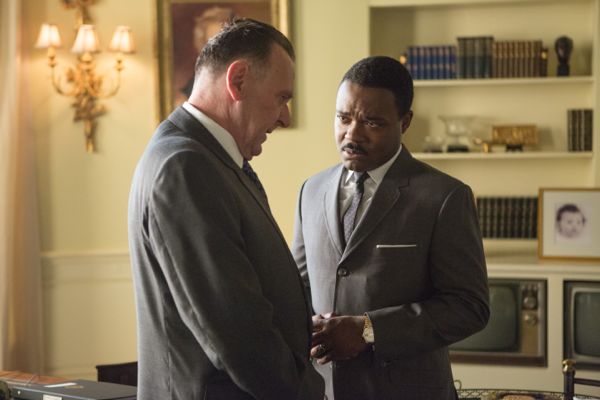
Q: For the cast, and also the director, there were a lot of really dark moments – obviously, this is really heavy material to work with and I can only imagine that as actors and directors and producers, you’re taking a lot of it home with you – what were some of the ways that you coped with the dark characters that you were dealing with?
TIM ROTH: Well, I got that one. What was it? OH, I didn’t think anyone was coming to me.
Q: How did you deal with the darkness?
TIM ROTH: How do you deal with that? You got to tap into your inner racist, ‘cause everybody’s got one. But I went to – my dad was a full-on leftie, an American man went to England and fought for the British in the Second World War, and when we were kids, and my mum too was a full-on leftie, so when we were kids we were taken to demonstrations and we were throwing stones at skinheads and stuff. And we were brought up that way to be active and to be socially active. And King as a presence in our house, as was Wallace. And Wallace was a monstrous human being, when were kids. It was a very flat two-dimensional kind of animal. And someone to loath, for good reason. But then when she came to me, when Ava came to me to have a go at this, what am I supposed to do? You’ve got to try and get a three-dimensional, walking sort of bag of bones, you’ve got to get that up and running. So I had to try and find some kind of humanity, something that I could latch onto. And the one thing I did, which is kind of similar to what David was talking about, was I looked at footage of him, there’s the obvious stuff, you know, that we all know and love, and then but there was a piece where his son was talking about him, and his son was talking about him in a very different way, and I grabbed onto that, so I could find a little bit of humanity to thread in the limited amount of space that we had to deal with this guy, and kind of threw that at the screen a little bit. But he’s horrible, which is fun. But we laughed a lot.
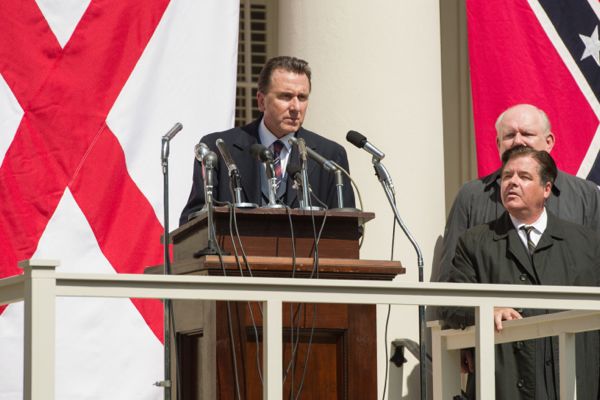
Q: This film, I think, looks at just how important knowing your history is, and I really think a lot of young people today are kind of far removed from that era. Like, for example, Oprah, in your Master Class, I remember when Cicely Tyson said she asked the 13 year old about Martin Luther King, and she said, “Who’s Martin Luther King?” So I would like to know from you how important is knowing your history?
OPRAH WINFREY: You already know the answer to the question because you’re asking it. I think you don’t know yourself and you don’t know where you’re going unless you know where you’ve come from. And Maya Angelou has a wonderful poem, it’s called “To Our Grandmothers” and in it she says, “I come as one but I stand as 10,000.” And I’ve been in multiple meetings where I was the single woman and the single black person within a 50 mile radius, but I step into that room as one, and I come with 10,000, and 10,000 and 10,000, at my back and my sides. And knowing that means I can go anywhere, I can do anything, because I recognize where I’ve come from and what I’ve come from. So the Annie Lee Coopers of the world whose names a lot of people didn’t make the history books and aren’t as known as Dr. King and John Lewis and all the others, were equally important in the courage that they demonstrated daily to stand inside and stand up for themselves, and I think that there is no great val – when you understand your history, you understand you.
Q: As we saw tens of thousands of marchers yesterday in this city and in cities around the country, it almost seems like it could have been a scene from this film, in terms of an outcry for human decency. Oprah, Ava, I’m just wondering what your thoughts are on that.
AVA DUVERNAY: Well, I think it is a jaw-dropping thing that this piece of art can meet this cultural moment that’s so rich, that’s so robust, that’s so bursting with energy of people, amplifying their voices. This film is about voice, this film is about being heard. You know, we’re sitting here in this hotel doing interviews about how these marches change the nation, while I hear people marching outside. One of the things about making a film like this, a film about history, as a filmmaker that you fear is how do you make it immediate, how do make it textural, relevant, something that people can see themselves in? But we are experiencing these very things right now and the thought of that, the timing, although this film took a long time to get made, although once we were able to make it, we had to make it really quickly, 32 days to shoot and run, run, run, that the timing –
OPRAH WINFREY: It took a day and a half to shoot Bloody Sunday. A day and a half.
AVA DUVERNAY: Yes, yes. That the timing was all perfect. Like you always tell me, it was exactly what it should be, and I feel like this film, not to overstate it, but it is here for a reason in this moment, and we just hope, I think, that it can add to the conversation, to the energy that’s going on. What a vibrant time, I mean, in our adult lives, to be able to see this kind of, you know, nation galvanized around these issues. I think it’s very exciting.
Q: Common, speak to us please about relevance. You are a hip hop artist by trade, an artist of many different kinds, and you were on a march just yesterday and the day before, but talk to us about what you brought to the role and what it means to you to be in such a film.
COMMON: Well, it’s a beautiful honor to be a part of Selma because as a kid I think the first person that I read about and came across that black people and white people both recognize as a hero was Dr. Martin Luther King. And he was always something I really, like, looked up to, and it became a point in my life where, you know, I became real [PH] Malcolm X-ist and it was like, I don’t know, Martin may be soft. But you know, as I grew and evolved as a human being, I realized that this peaceful protest is one of the strongest things you can do, and the strength that it took to do that. Me being involved in Selma, like, taught me that it was women, it was men, it was children, it was a spirit that they said we want freedom, we want justice, and a lot of people contributed to that. You know, because originally I was like, man, as Martin Luther King, you know is Martin Luther King, but to get to meet the everyday people, some people we don’t know their names. Yeah, we do know of the Annie Lee Coopers and we do know of the [PH] C.T. Vivians, but it’s some people like I had a journalist yesterday talk to us about her uncle who was out marching, and we don’t know his name, but everybody contributed, and what this film did was make me realize that we all have a part in contributing towards making the world better. So it was like me being – this was like a life changing experience for me because I felt I could do more, you know, just being able to be James Bevel and be around Ava and be around the cast, and the people that we worked with. I was, like, I have to do more, I mean, learning about what they did, I got to do more. And now people are out there doing more. And we want to do more. So I’m just grateful to be a part of it, and the revolution is here.
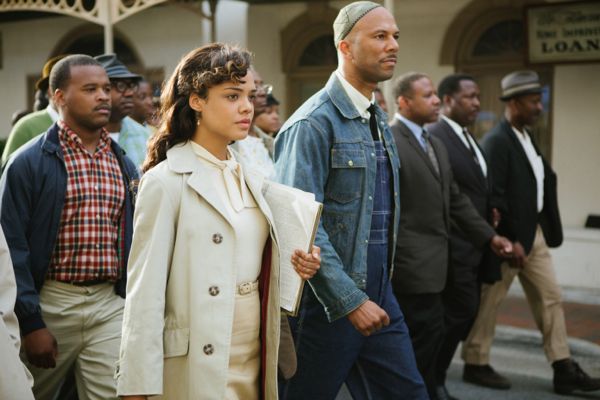
Q: A lot of people are going to draw parallels, of course, to what happened then and what’s happening now. Talk to me a little bit about that three step strategy that the [PH] SCLC had that Dr. King’s character said. It was three steps. I can’t recall exactly. Do you think that strategy should still play to what we’re experiencing today? And I’m sorry that I can’t recall the three steps. I know you know, though, David.
DAVID OYELOWO: You’re right. I do. Well I think the parallels that I can see, in terms of Selma and Ferguson, is in the same way that in Ferguson, when it was voting rights that was being asked for, it was a black problem. Once Bloody Sunday happened and the country saw those images, it became an American problem. I think with Ferguson, when it was about Ferguson, it was a black problem. When the country saw the injustice of what happened to Eric Garner, it became an American problem. And that was the point beyond which black and white came together and these marches really gained momentum. And in that instance, in Selma, the problem was voting rights and there was federal intervention, because what you had is a situation whereby, for want of a better phrase, the game was rigged. You know, as a black person, if you got killed and someone was brought on trial, they most likely would get off because it was a white jury of their peers. You know, we have a situation now where what we need is police reform and the game is rigged again, because there is a conflict of interest, if it’s local prosecutors and the police. So I would say we need federal intervention again, but also we just need to focus in what are the demands. My fear at the moment is we have this amazing slew of protests but we don’t have someone like Dr. King articulating what it is we want, what it is we need.
OPRAH WINFREY: A clear intention.
DAVID OYELOWO: A clear intention. And that’s not to say that we need a Dr. King in order to do that, but what I hope Selma shows and what is clearly needed, is that clear intention. What are we asking for, how are we going to ask for it in a tactical, politically savvy way, and I really hope and pray that our film in some ways shows what was effective in the past and how we can be effective going forward.
Q: Andre Holland, you play Andrew Young, sir. There was a camaraderie and just a spirit of kind of friendship and kinship between Andrew and Dr. King, and kind of his boys, if you will, right, just the kind of crew that was putting this all together and going through the [SOUNDS LIKE] south. Talk about that feeling kind of on set or just how you were able to capture that and bring that to the screen.
ANDRE HOLLAND: Thank you. Good afternoon, everybody. I think, you know, jumping on what David just said, you know, one of the things I found most sort of remarkable about the experience was learning that there were so many people who were leaders in their own right. Andrew Young, John Lewis, Bevel, so many of them who have been incredible leaders, you know. And I think that that same sort of feeling of camaraderie did extend to our set. And there were these moments of magic that I think happened during the filming of this process, one of which for me, you know, having been born and raised in Birmingham and growing up very near 16th Street Church, my family actually ran a funeral home that’s right across the street from 16th Street Church, and my uncle used to always tell me stories about that time, you know, at the Kelly Ingram Park. And one of the stories he told me was about – one of many – it was about a white man named [PH] Lamar Weaver who had been protesting and helping with the movement and one night was chased through the streets all around Kelly Ingram Park and ended up at the doorstep of the [PH] Pool Funeral Chapel, and in order to keep him from being killed, my uncle Ernest brought him in the funeral home and hid him in a casket in the back, so that they couldn’t find him. And those kind of stories, to me, were magical, you know, and the fact that we got to bring these people to life, you know, not just the ones who everyone knows, but the ones who people know less about, but also play such an instrumental part, to me was probably the most special part of the entire experience.
Q: We all have moments in life where, you know, we meet someone and we sort of know that that person is special, you know, it’s like this moment where you might go tell your friends, or it sort of connects for you, when you know that this person is a game changer, they’re going to do something amazing. What was that moment for you? You can call it an Aha moment, with Ava, where you knew that this was a history maker, a visionary, she was it?
OPRAH WINFREY: Oh, that’s a great question. Thanks for giving me that question. Actually, I had that moment first with David Oyelowo. David and I were in the trailer doing Butler, and David handed me the tape of – he said, “I did this little film.”
DAVID OYELOWO: She always makes me sound like Oliver Twist.
OPRAH WINFREY: Anyway, I looked at the tape, I googled Ava, I saw that she was an African American woman, director, and read a little bit of her history, and I emailed her, got her email address from David. Did I call you up? I didn’t call you up.
AVA DUVERNAY: You called me up.
OPRAH WINFREY: I did? I gave you a call. I emailed you first and said we’re going to be friends, and then I called her up and told her, we’re gonna be –
AVA DUVERNAY: She emailed me and said we’re going to be friends.
OPRAH WINFREY: Yeah, and [INDISCERNIBLE] emailed and said we’re going to be friends. Please send me your phone number so I can call you. We’re gonna be friends, and send me your phone number. And I could feel from her countenance, from the spirit of her, that there was something inside her that I also had inside me, and I could see that in David and that’s why I befriended David on The Butler, you know? There is, I call it, you know, at my school, when I was looking for girls for my school, I call it the “It factor” and those who have it recognize it in others. And I could sense from David a level of humility and a level of pure passion and desire to honor his calling, and the calling beyond just being an actor, but his calling as a human being, to honor what God had put him here to do. And I saw that in him ‘cause I have that in myself, and I told him we were gonna be friends. I could see that he is favored, he is favored from on high. And I’ve had that favor, so I know what that looks like and I wanted to do whatever I could to elevate that. And I could feel the same thing in Ava. And I think the part of my trajectory here on the planet has been to try to inspire and lift other people up, so when I saw that here was somebody who has that thing, that “it thing” I wanted to do everything in my power to lift that up, to bring light to that, to bring attention to that. And so that’s what happened. And now, we’re just buds, [SOUNDS LIKE] real buds, yeah. Really.
Q: How were you able to help articulate that kind of beauty and the being able to have lines that were about being a wife and being in love, because it was not easy for Coretta Scott King in this relationship with such an individual as Martin was and the mission that he was on.
CARMEN EJOGO: The sexy. Yeah. I mean, I think David and I had always intended to make these people as authentic as a couple as possible and that includes sensuality, that includes touching, that includes being intimate, and even if we haven’t seen it before, I don’t think in any way we felt we were doing a disservice to the legacy or to the heroism of these people by showing that they had human desires and human elements to them. In fact, I felt very strongly that we were doing them an absolute service by showing that they had the same desires and wants and frailties and foibles and doubts as the rest of us, because to then be able to achieve the things that they did, despite the fact that they are as human as the rest of us, makes them even more aspirational, to me. So it was an absolute privilege to flesh them out and to make them desirous of flesh, and all of those things that a married couple are.
Q: Selma’s emotionally riveting and it grabs you, and the times today, our contemporary times, are emotionally riveting also. And if Ferguson and if Eric Garner hadn’t happened, and this film was still released today, what would your – the parallels that you’re drawing, that people are drawing, to those situations and Selma, what would they be if those two things hadn’t happened, and what would you want the message to be of the film today?
AVA DUVERNAY: Well, I mean, you know, distressed race relations in this country is ambient, it’s not just happening because of these two things, so when we were making the film, I mean, it’s part of the atmosphere of this county, I certainly feel that as a person of color. So you know, these incidences are amplifying that in a very specific way, where it’s feeling it and like it’s very much at the forefront of what everyone’s thinking about, but as a person of color in this country, I think about that all the time, when my brothers walk out of the house and I hope that they come back. And that’s just always there. So yes, this is a beautiful time where we’re able to kind of, you know, there’s a magnifying glass on it, but it certainly I don’t think would have been entirely different if these events hadn’t happened. And what was top of mind for me while making the film was the Voting Rights Act. That was all we were thinking about and talking about early on. I really thought that that would be a big topic of conversation as we presented the film, you know, the dismantling of the very act that we are chronicling its creation in the film, the violence to that act that has happened and is hard to put back together. So there’s so much going on within the film that it’s not all specific to Ferguson, I don’t think, and hopefully, I mean, that’s what art does, it continues to illuminate things, as the years go on. What we will see in this film Selma, hopefully if people are watching it 10 years from now, there’s something that we probably haven’t even thought of yet. I don’t know if that answers your questions, but yeah.
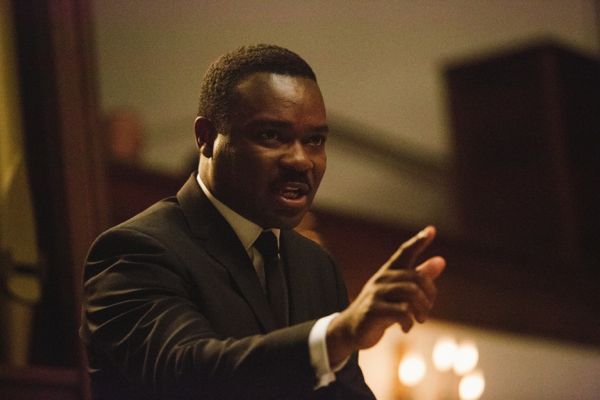
Q: Sidney Poitier said he chooses to do his work as a reflection of his values. Is this a project that you’ve chose, sir, as a reflection of who you are?
DAVID OYELOWO: Yeah. Never before have I engaged in an artist endeavor that so brings everything I am as a man together. I’m a Christian myself, I have four children. Because of my faith, sacrificial love in the face of injustice, these are the things I hold dear. So, you know, as a man, as a storyteller, as a citizen of the world, you know, what you see when you watch Selma is everything I value and aspire to be. One of the things I was so glad that we showed – two of the things – was how humanity came together to fight this cause together, black, white, people of several faiths coming together. I think that that’s the most beautiful thing we do as human beings is coming together. I also feel, as a man, one of the things I was so proud of with this film was Ava bringing to light the women in this film. I have a beautiful wife. I have an incredible daughter. I am a big fan of women. And you know, they were marginalized within this movement, even though it was a movement against injustice and inequality. They were just as brilliant, they were just as bright, they were just as courageous and tenacious, and you know, I just feel one of the greatest blessings of my life was also seeing Ava and Oprah behind the monitor while we were shooting this thing. That, to me, is definitely a realization of Dr. King’s dream, this beautiful black woman telling this story so beautifully, this other beautiful black woman helping us get this story told. This wouldn’t have happened 50 years ago, in terms of them helping us get this done, and so if this is one of, if not the greatest, things I do with my life, I will be happy with that.
